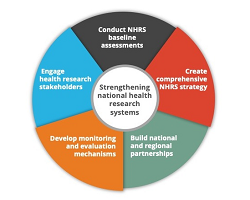New publication to support national health research systems strengthening

WHO/Tyrone Reden
A recently published WHO Health Evidence Network (HEN) report provides a synthesis of all the best available global evidence on policies, interventions and tools for effectively establishing, strengthening and unifying national health research systems.
The 69th report in the HEN synthesis series was commissioned to support actions in strengthening health research systems in the WHO European Region. At a time when the world is fighting a global pandemic, strong health research systems are more important than ever to delivering an evidence-informed response.
High-quality and context-relevant research is needed for planning and implementing an effective public health response, delivering safe and effective frontline services and developing vaccines, diagnostics and treatment options. However, the organization of health research systems is highly complex. Health research is too often fragmented among isolated groups of research producers and users. Hence, even countries which conduct considerable research, may not be able to maximize its benefits if it is not fully organized at a systems level.
Unifying health research systems for better health
“Strengthening national health research systems helps efforts to strengthen health systems, and meet the Sustainable Development Goals,” says lead author, Professor Steve Hanney of Brunel University London. Recognizing the importance of the work, an interim version of the publication was presented at the Fifth Global Symposium on Health Systems Research in 2018, where it received an award.
The review identifies 4 functions of national health research systems: stewardship and governance, financing, capacity-building, and producing and using research. It outlines approaches that worked well in several countries to establish, strengthen and unify these specific functions.
Based on the synthesized evidence, the main policy approaches for countries that wish to strengthen their health research systems as a stepping stone towards better health are:
- conduct an analysis of the current state of health research systems in-country;
- develop, apply and sustain a comprehensive strategy (policy or legislation) for health research, covering all 4 health research system functions, aligned with national vision and health priorities;
- embed stakeholder engagement in the development of the comprehensive strategy;
- develop and apply monitoring and evaluation tools that focus on demonstrating the benefits of health research systems;
- invest in and advocate for intercountry (and in-country) health research partnerships and regional collaboration.
The Health Evidence Network: catalyst to WHO’s mandate to generate evidence
Drawing on evidence from different disciplines, and both peer-reviewed and grey literature, HEN synthesis reports summarize what is known about a particular policy issue to produce a compendium of good practices for making policies, processes, procedures and regulations more culture appropriate, person centred and policy-maker friendly.
The HEN Secretariat has collaborated with teams in areas such as migration and health, and the cultural contexts of health and well-being, as well as with the WHO European Office for the Prevention and Control of Noncommunicable Diseases in Moscow, to produce award-winning evidence synthesis publications. The HEN report on arts and health recently won the Global Aesthetic Achievement of the Year award from the Finnish Society for Aesthetics, while the HEN report on the use of narrative research in the health sector received the “Highly commended” recognition in the public health category of the prestigious BMA Medical Book Awards in 2017.
HEN synthesis reports are also indexed in the National Center for Biotechnology Information (NCBI) register.
For more information about the HEN series and national health research systems strengthening, please contact euhen@who.int.



